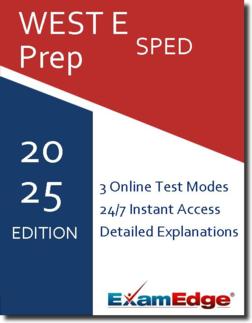WEST-E Special Education (070) Practice Tests & Test Prep by Exam Edge - Test Reviews
Based on 32 Reviews
- Real Exam Simulation: Timed questions and matching content build comfort for your WEST-E SPED test day.
- Instant, 24/7 Access: Web-based WEST-E Special Education practice exams with no software needed.
- Clear Explanations: Step-by-step answers and explanations for your WEST-E exam to strengthen understanding.
- Boosted Confidence: Reduces anxiety and improves test-taking skills to ace your WEST-E Special Education (070).

WEST-E Special Education (070) Practice Tests & Test Prep by Exam Edge - Review
WEST-E Special Education - Reviews
Excellent
Based on
160
reviews
“ I just received notice of passing the middle school math (012) test with a score of 292. My last 4 test scores on the WESTEmath site averaged 291. I'd say the practice tests mirror the actual test quite well and the practice test scores are a very good indicator of how well you'll do on the actual t ...
Read More
Phillip ,
“ Just wanted to thank you for making the practice tests available. They made a huge difference. Took the 2 Elementary subtests this past Saturday and passed! These practice tests were by far the best tool to use to be prepared and feel confident going into the real testing situation. Thanks again. Ri ...
Read More
Sonja, Washington
“ I just want to say thank you! I purchased several study guides & flash cards to prepare for my test. I was feeling frustrated by the amount of content. I decided to purchase your practice tests and I wish I hadn't wasted my money on the others. Your practice tests resemble the test and I fel ...
Read More
Heather, Spokane, WA
“ Thank you for the opportunities to take several practice tests! This is really helpful to see which areas I need to study more, and where I have some of my greatest misconceptions. It is helping me to prepare for the real WEST-E test!
Tyler , Olympia, Washington
“ Thank you so much!! Your practice exam in Bilingual Education was so helpful! I was able to pass with no problem at all! Javier Roman
JAVIER , seattle, Washington
See why our users from 154 countries love us for their exam prep! Including 32 reviews for the WEST-E SPED exam.
Exam Edge is an Industry Leader in Online Test Prep. We work with our Institutional Partners to offer a wide array of practice tests that will help you prepare for your big exam. No Matter how niche field of interest might be, were here to help you prepare for your test day.
| 2.8M | 4.5M | |
| Users | Tests Taken | |
| 100K | 19 | |
| Unique Exams | Years in Business | |


